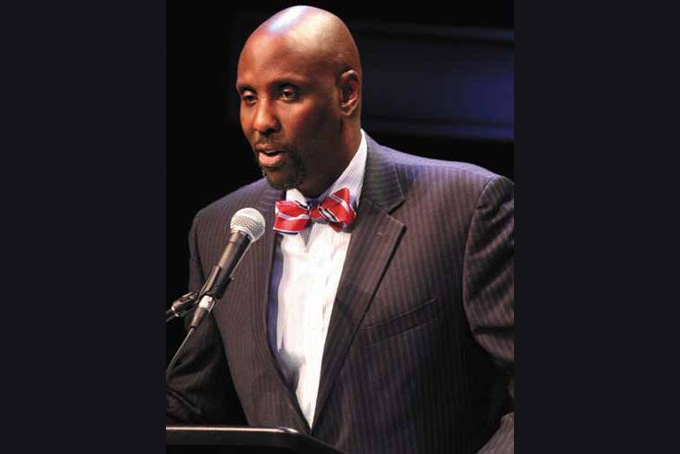
REX CRAWLEY
The last thing Dr. Rex Crawley ever contemplated he’d have to worry about while in the process of getting his doctoral degree at Ohio State University was cancer. His mind was on courses, his thesis, but not being diagnosed with the big C. But in 1995, while at school, he was diagnosed with Non-Hodgkins Lymphoma, a cancer that starts in the lymphocytes, which are in the lymph nodes and other lymphoid tissue, such as the spleen and bone marrow.
After being diagnosed, he weighed his treatment options and decided to have a bone marrow transplant, which left him in remission for more than 12 years.
Then in 2011 he was re-diagnosed with NHL. The news of the return of the disease left him “surprised and devastated.” He underwent a grueling regimen of chemotherapy, which put him back in remission.
Now, 2013, Crawley, a professor and assistant dean at Robert Morris University’s School of Communications and Information Systems, and the co-director of the Black Male Leadership Development Institute, is undergoing his third bout with this disease and in need of a bone marrow transplant. Neither of his siblings are a match, which forces him to look elsewhere for a donor. Since matches must have the same genetic code, race and ethnicity play a vital role, and with African-Americans the least likely to donate compared to their White, Hispanic and Asian counterparts, the odds that he will find a donor are very low.
So, for what may be his last mission, Crawley is dedicated to spreading awareness for the need of African-American donors.
“I’m sitting here by the phone hoping I get a call saying, ‘we found a match for you.’ Unfortunately, there are hundreds of thousands out there whose lives also depend on it,” said Crawley. “I’m hoping my story will enlighten the community because I am committed to increasing awareness of this issue. Even if we are unable to find a match for me, my concern is for the thousands of cancer patients that are living day-by-day and waiting for a match.”
According to the Institute for Justice website, the percentage of African-American donors who are available and willing to donate is 34 percent, compared to 65 percent for Caucasians, 47 percent for Hispanics and 44 percent for Asians. Also, African-American patients find an unrelated donor 25 percent of the time, while Caucasians find a donor 75 percent of the time, Hispanics 45 percent of the time and Asians 40 percent of the time.
“Until the African-American community gets comfortable with donating, folks will continue to die everyday,” said Crawley. “The first step is getting registered. Then you can decide if you want to go further.”
Joining the registry is the first step; it’s easy and painless. It only requires a sample of one’s DNA through a simple swabbing of the cheek. According to the Be The Match foundation, which is operated by the National Marrow Donor Program, the largest manager of marrow registry in the world, once the sample is taken, specific protein markers are compared with markers of those in need of a bone marrow transplant. And once a match is found, the more evasive process begins.
When asked why he thinks African-Americans are less likely to become donors, Crawley said he thinks it culturally goes back to a fear and mistrust of the health projects and the medical field due to the manipulation that took place during the historic Tuskegee Syphilis Experiment. He also said he feels it’s a lack of education and that donation requires time and resources, which may be an obstacle if one has a family or is low-income. But he said that is no excuse, “other races rise above that obstacle.”
When it comes to the immediacy of needing a match, “Time is of the essence,” Crawley said. He is currently in his fourth of a six-cycle chemotherapy treatment. After the sixth cycle, he would immediately have to have a transplant.
Although a bone marrow transplant is the most ideal and more common option, Crawley said he does have alternative options to explore. He could try and use his own bone marrow, by cleaning it up and replanting it; he could use cord blood, where blood stem cells are taken from umbilical cords that mothers donate; or he could undergo a Haploidentical transplant, which would use a portion of blood cells from his siblings.
To help cope with his illness, Crawley has found comfort in blogging. “I write a blog about my experiences. It has been rewarding to share what everyday is like as a cancer survivor, but more importantly, as a Black male cancer survivor.” A portion of his blogs will be published as part of an upcoming textbook.
But Crawley said his ultimate dream is for Pittsburgh to be the founding city for a branch of the National Marrow Donors Program’s Black Bone Marrow registry. The branch would focus on the recruitment and management of Black bone marrow donors.
“Maybe the ask needs to come from someone who looks like me; and be managed and controlled by someone who looks like me, then maybe African-Americans will be more inclined to participate,” Crawley said.
To help with finding a donor, Crawley said Robert Morris University, and his church and fraternity are looking into galvanizing a bone marrow drive.
But no matter what, without involvement from the Black community as a whole, people will continue to lose their fights.
“We, as a community, have to come together and get past the stigma of donation, not just with bone marrow, but organ donation too,” Crawley said. “I’m asking people to just get tested, get on the list. Without getting registered you never know if you have the opportunity to save someone’s life.”
For more information on bone marrow donation, visit www.bethematch.org.
Follow @NewPghCourier on Twitter https://twitter.com/NewPghCourier
Like us at https://www.facebook.com/pages/New-Pittsburgh-Courier/143866755628836?ref=hl
Download our mobile app at https://www.appshopper.com/news/new-pittsburgh-courier